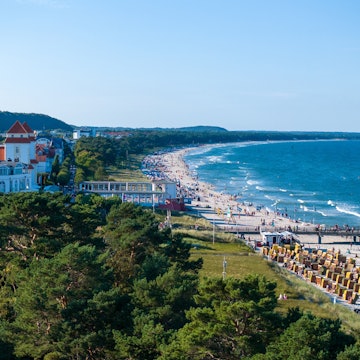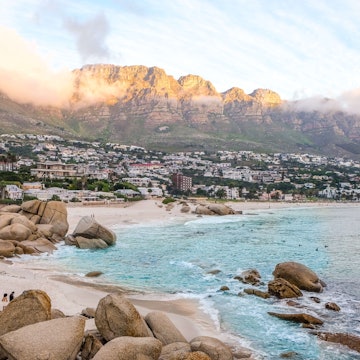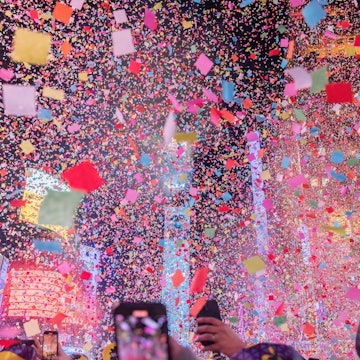

Oktoberfest in the Hacker-Pschorr beer tent, Munich. FooTToo/Getty
Oktoberfest returns on September 20 and runs through to October 5, 2025, for 16 joyous days of beer swilling. Every year, more than 7 million thirsty visitors descend on the German city of Munich for the celebration featuring parades, fair rides, traditional food and music, and of course, lots of beer.
Oktoberfest can be an exciting event for outsiders to experience Bavarian culture, but it can be hectic and difficult to navigate for the uninitiated, particularly after a few liters of Löwenbräu. Don’t fret – we’ve got you covered with this guide to the festival of all festivals.
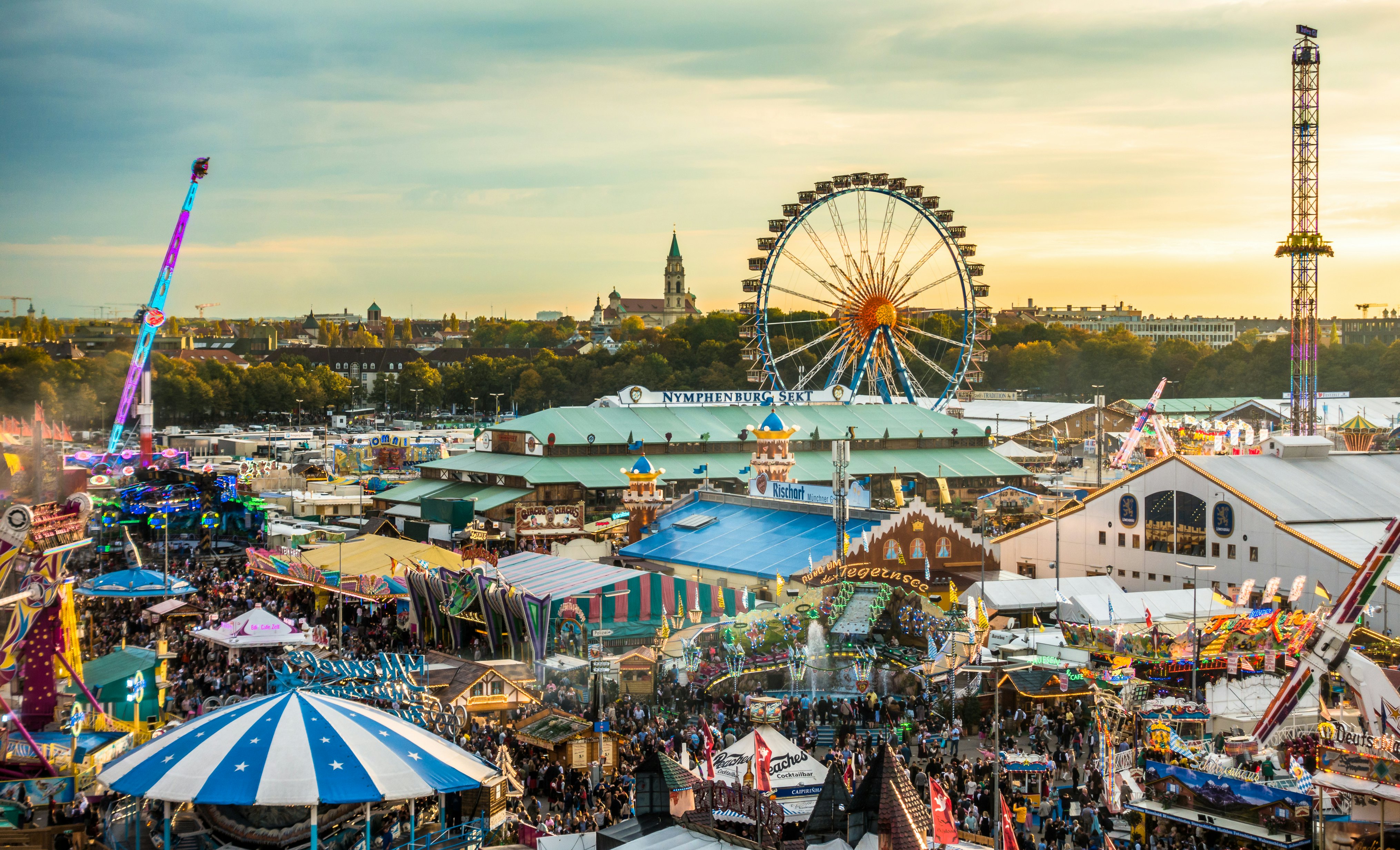
What is Oktoberfest?
Oktoberfest began in 1810 as a series of horse races honoring the marriage of Crown Prince Ludwig and Princess Therese of Saxe-Hildburghausen. It was such a big hit that it became an annual event with more activities popping up every year. It wasn’t until the late 19th century that sausages and beer were served. Nowadays, the keg-tapping and countless meaty morsels available are the most recognizable aspect of the event, along with the traditional Bavarian garb.
But Oktoberfest is really about celebrating Bavarian culture, so outsiders can learn a lot from simply visiting various attractions and experiencing the atmosphere. You can also brush up on your brewing knowledge, with various ways to find out more about how the beer was made.
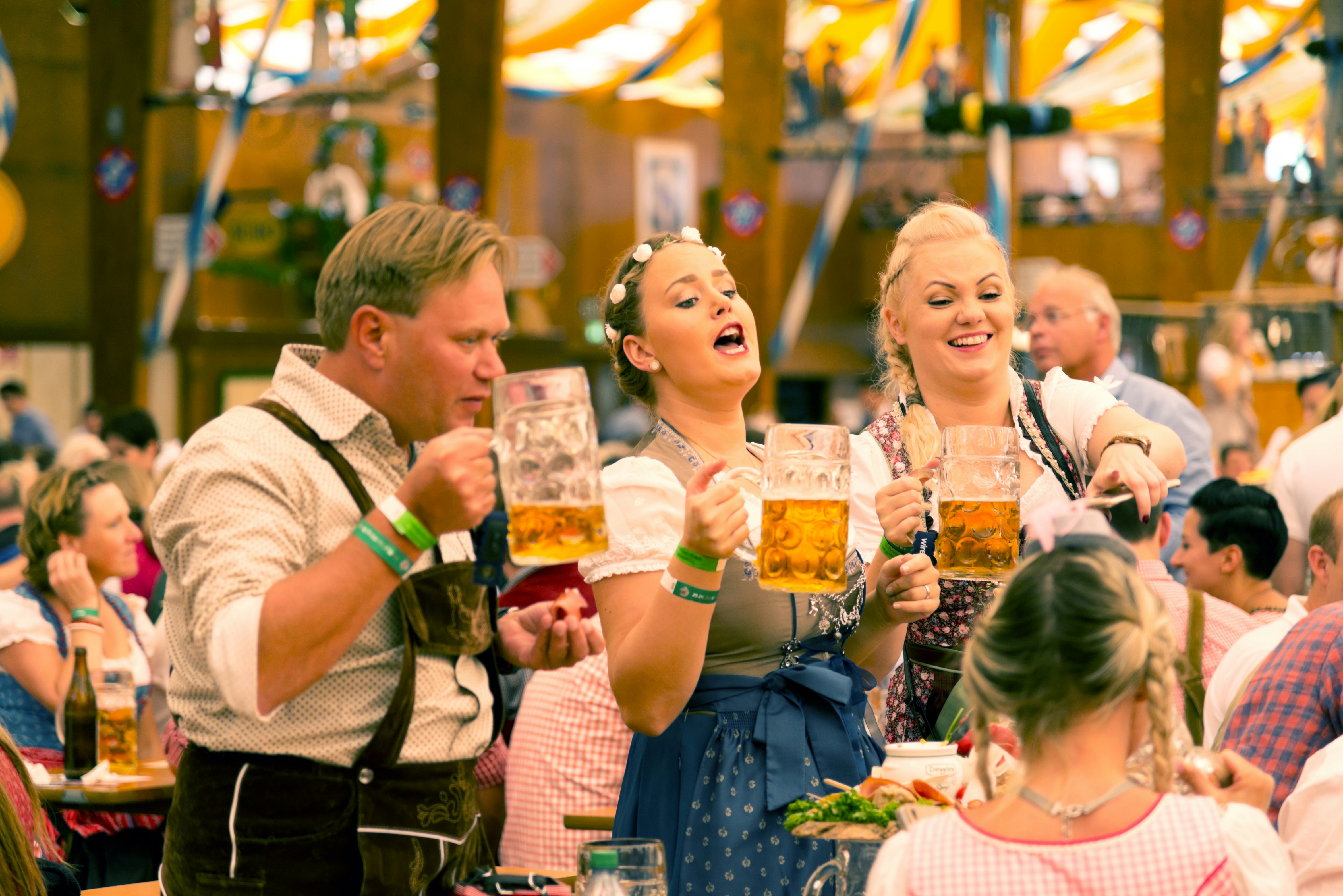
Even though it's not all about drinking beer, about 7 million liters of beer were served at Oktoberfest in 2024. Waitresses in the traditional dirndl (full-skirted dress with tight bodice and small apron) and waiters donning lederhosen (translates to "leather pants," but look somewhat like shorts) ferry giant frothing mugs (Masskruege) of beer to thirsty attendees. Even this simple act is a spectacle as they are often carrying an unbelievable number at once – the current world record is for 26 full Masskruege!
The wonders of Oktoberfest have spread through Germany and across the globe. You can also find similar copycat events in Berlin and Hanover, Germany; Kitchener-Waterloo, Canada; Blumenau, Brazil; London; Pretoria, South Africa; and countless cities in the United States.

What beer is served at Oktoberfest?
All the lager pulled at Oktoberfest must have been brewed within Munich’s city limits, which restricts the number of breweries permitted to wet your whistle to six: Hofbräu-München (of Hofbräuhaus fame), the world-famous Paulaner, Löwenbräu, Augustiner, and the lesser-known Hacker-Pschorr and Spatenbräu.
The famous 1L Mass brought to your table by a Dirndl-trussed waitress contains pretty strong stuff as the breweries cook up special concoctions for the occasion (usually known as Oktoberfestbier). The percentage of alcohol starts at around 5.8%, which makes a single Mass the equivalent of almost 3.5 pints of most regular ales in Britain, Australia and the USA. Traditionally the most potent brews are piped to the Wiesn – a local name for the event – by Hofbräu, and the weakest by Hacker-Pschorr.
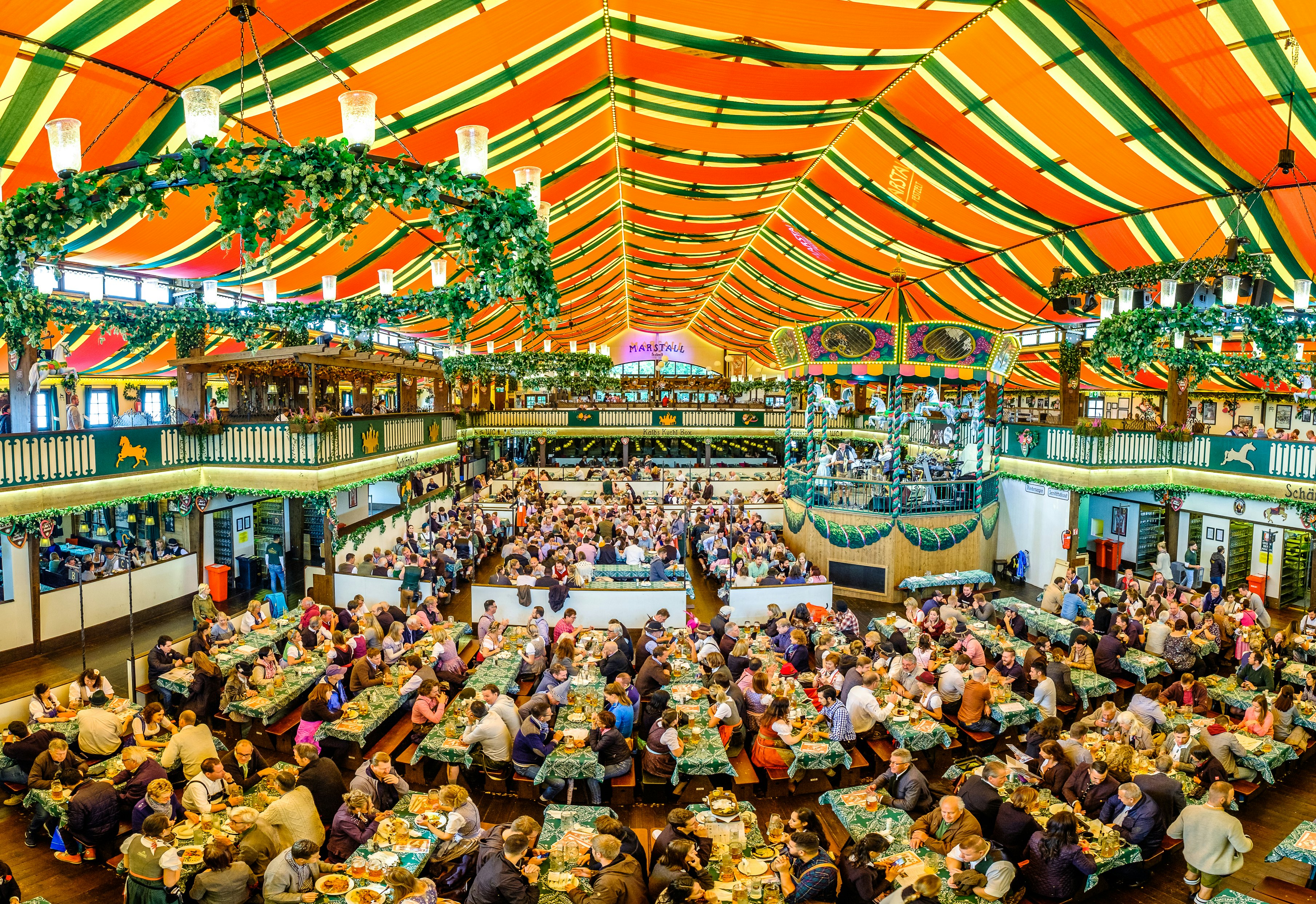
What is there to eat at Oktoberfest?
After the beer, the second most exciting attraction is the food. Bavarians will typically begin a day at Oktoberfest with some Weisswurst, a white sausage consisting of veal and bacon meat. Lunch might be half a rotisserie chicken (Hendl), a roasted pork knuckle drowned in gravy (Schweinhaxen), or even more sausages.
Throughout the day, visitors who feel the pang of drunken hunger can snack on pretzels, roasted almonds or a traditional shredded pancake dish called Kaiserschmarrn. The Lebkuchenherzen (gingerbread hearts) may look cute, but you’re much better off grabbing some Kaiserschmarrn if you’ve got hankering for something sweet.
Eat before you start drinking. There’s a reason the food served in the tents is so hefty and filling – it can be hard to track how many of those one-liter Masskruege you’re getting through. Don’t expect change from the wait staff. They have seriously hectic jobs, so any remainder from the cost of your drinks is assumed to be a tip.
What else happens at Oktoberfest?
If you can still move after all that beer and food, the festival also has traditional Bavarian folk music shows, puppet shows and several parades to watch. But after several drinks and sausages, you should stay off the bumper cars and amusement rides. This should go without saying, but you won’t want to be strapped into a seat 10m in the air when your beer or food decides to come back up.
Regulars have also started a tradition of rolling down a large hill while inebriated. Partake at your own risk.

What should I wear to Oktoberfest?
Lederhosen and dirndl are not compulsory, but if you’re going to commit, you should go the whole hog. Wearing your regular clothes won’t get you any unwanted attention, and neither will the traditional garb, but if you show up in a low-quality bachelor-party-style fancy dress costume, you risk offending quite a large number of the festival’s attendees.
Pay attention to how you tie your dirndl. There’s a historical code based on the placement of the bow; front-right means you’re married or in a relationship, front-left means you’re single, and front middle means you’re a virgin.
What do I need to book in advance for Oktoberfest?
Secure accommodations well in advance; rooms are booked up quickly. Camping is another option, or you could consider staying a bit further from the city.
Book a table for the tent you want to enter. You’ll have a much nicer experience and you won’t need to wait in the infamously long lines. If you didn't book a table, aim for the tents’ side entrances to avoid the lines. You’ll still need to wait, but maybe not as long.
Take cash. There are very few ATMs available, and you can expect to wait awhile to withdraw money, so you’ll want to have some notes and coins with you. Bear in mind that each beer is likely to cost between €14.50 and €15.80.
What's the best way to get to Oktoberfest?
Don’t drive directly to the event. Parking is a nightmare and if you’re planning to sample the region’s beautiful beers, you won’t be able to drive home anyway. It’s a good idea to leave your car at a Park & Ride or in a car park and use public transportation to get to the festival.
Munich’s Hauptbahnhof, the central public transport station, is a short walk from the Oktoberfest celebrations. Or the nearest U-bahn (underground railway) stations are Theresienwiese or Schwanthalerhöhe.
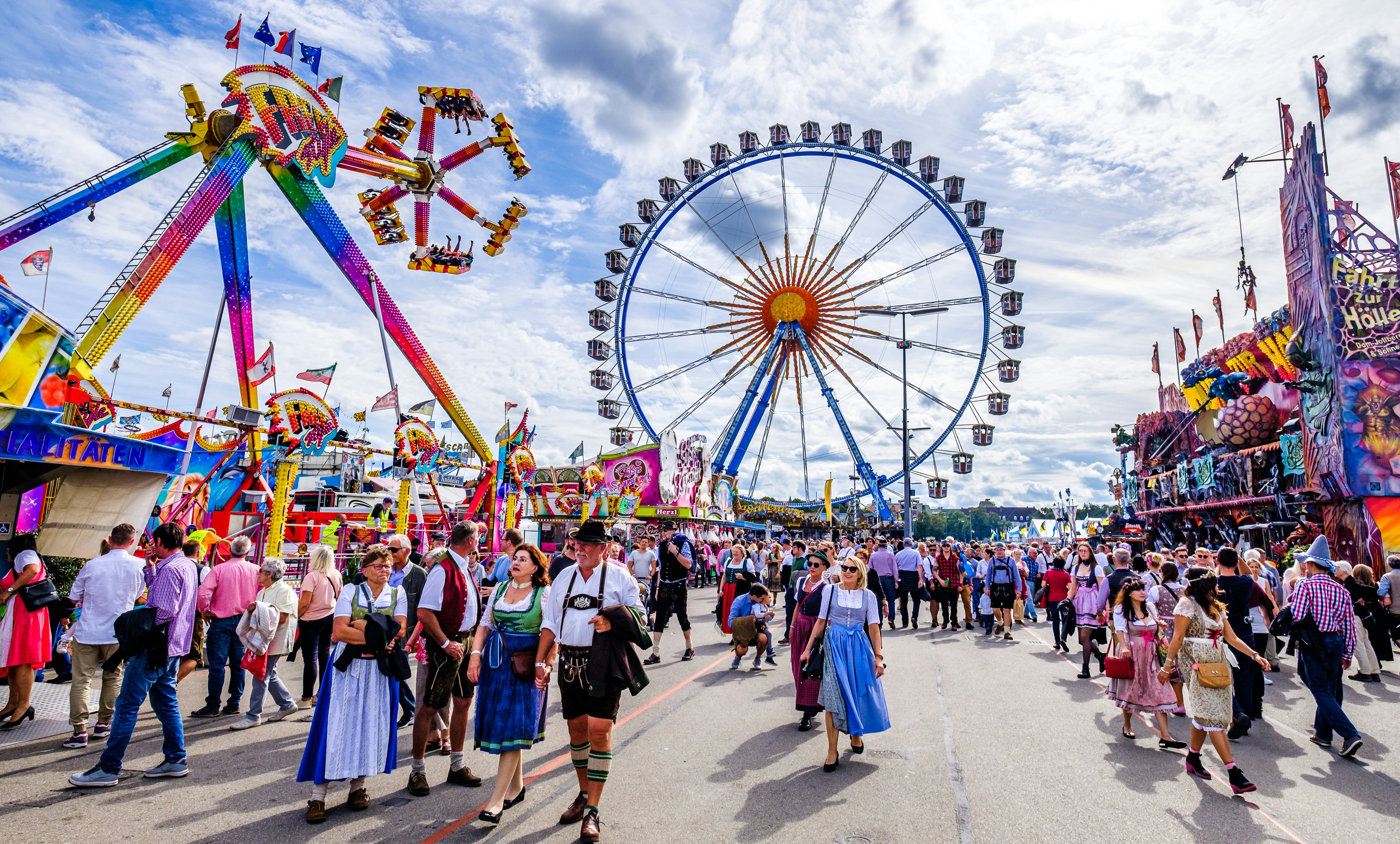
What are the rules at Oktoberfest?
Don’t stand on the tables. You don’t want to be on the wrong side of an Oktoberfest security guard. And don’t be surprised by people snorting things all around you – sniffing tobacco is quite common in Bavaria. Since smoking isn’t allowed in the tents, you’ll often see people having a little sniff.
How safe is Oktoberfest?
Beware of the Kotzhügel. This area, whose name means Puke Hill, is where people who’ve overindulged go to relieve themselves. Keep an eye on your belongings and make sure your pockets are secure. Like many large public events, Oktoberfest can inevitably attract opportunist thieves.









